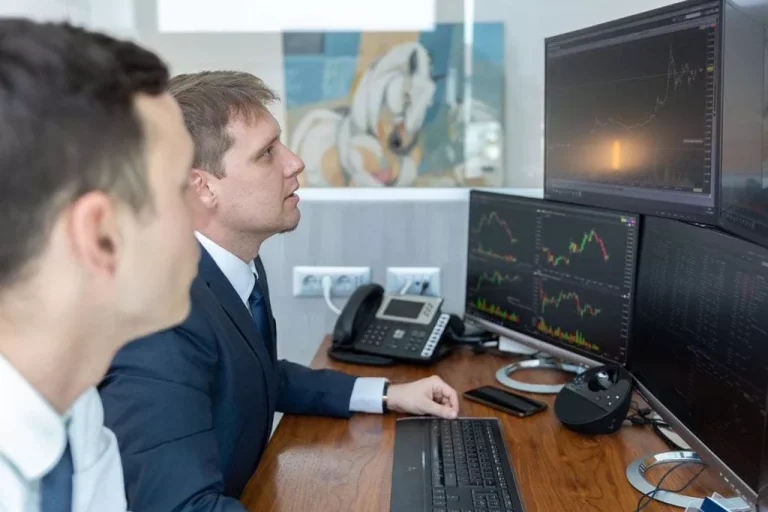Brokers must report how orders are filled and at what prices compared to the publicly available bid and ask spread at the time. The SEC also mandates that brokers must disclose if their orders are not routed for the best execution. When a trader transacts with a brokerage, the brokerage is always taking the other side of their trade.

A broker is an individual or a firm that buys and sells securities on behalf of their clients. In the financial world, brokers are intermediaries who have the authorization and expertise to buy securities on an investor’s behalf. The investments that brokers offer include securities, stocks, mutual funds, exchange-traded funds (ETFs), and even real estate. Mutual funds and ETFs are similar products in that they both contain a basket of securities such as stocks and bonds. A cryptocurrency exchange works by giving traders a platform to buy and sell coins, tokens, and assets. An example of a pairing would be Bitcoin to the U.S. dollar, which would be abbreviated to BTC to USD on an exchange.
These markets are usually owned by a company who pairs buyers and sellers of different assets and maintains the market’s fairness. You can either go with an exchange or a broker depending upon the amount of risk you can handle and the trading limit as well as criteria. If you want to earn larger profits over a longer period of time and have experience there is no harm in going with exchange platforms. However, if you lack basic knowledge and are new to cryptocurrency, trading with a broker is the safest option.
Nowadays, everyone who knows at least something about finance has heard of cryptocurrencies. In 2017, this industry exploded in popularity, and the crypto market began attracting the attention of more and more traders throughout the world. With extreme volatility and virtually unlimited profit potential, people started going absolutely crazy about it. As a result, a lot of tools, products, and services appeared in the market that opened the door to earning with cryptocurrencies. Brokers and market makers are two very important players in the market.
This means that unlike many larger brokers they carry no inventory of shares, but act as agents for their clients to get the best trade executions. A forex broker is a financial services company that provides traders access to a platform for buying and selling foreign currencies. Regardless if you’re trading via a crypto broker or an exchange, make sure that you are protecting yourself against scams and money laundering, both of which are frequent occurrences in the cryptosphere. Bear in mind that crypto brokers and exchanges that ensure high transparency and compliance also typically provide users with reliable access, using state-of-the-art safety measures.
What is a broker?
This means that exchanges must follow certain rules and regulations in order to operate, while brokers do not have to adhere to these same standards. In doing so, the dealer provides liquidity in the market at the cost of a small premium. In other words, dealers will often set bid prices lower than the market and ask prices higher. Brokers’ services are also suitable for those clients who are engaged in short and medium-term margin trading to benefit from fluctuations in the price of cryptocurrencies. The process of verification itself will take a bit less time than on an exchange.
When transacting on an exchange there are many potential counterparties you could be trading with. Instead, it matches corresponding traders together, allowing them to trade with each other. You can buy currency through them and hold it for longer periods and sell when you hit the targeted asset value. You can also bid for values here and that is the major crypto exchange vs broker difference. You can bid on your own rates but the purchase will only be completed when any buyer shows interest in your specified rate.
Developing Saga Participant Code For Compensating Transactions
It’s also worth remembering that brokers generally have access to a greater liquidity pool. A trading broker may also be able to offer you facilities that an exchange cannot. Leverage is one such tool – you can enter the market with an enhanced position by accepting the leverage provided by a broker. Although brokers may route certain orders to certain venues for additional revenue, the SEC also requires them to disclose the quality of their trade execution.

Additionally, both parties must have their assets on the exchange at the time of the trade. Let us focus on some of the key differences we can see while working with a crypto broker or an exchange. A real estate broker, real estate agent or realtor is a person who represents sellers or buyers of real estate or real property. While a broker may work independently, an agent usually works under a licensed broker to represent clients.
What Exactly Does a Broker Do?
Market makers are useful because they are always ready to buy and sell as long as the investor is willing to pay a specific price. Market makers essentially act as wholesalers by buying and selling securities to satisfy the market—the prices they set reflect market supply and demand. When the demand for a security is low, and supply is high, the price of the security will be low. If the demand is high and supply is low, the price of the security will be high. Market makers are obligated to sell and buy at the price and size they have quoted. Decentralised exchanges do, however, have far more limitations that a centralised exchange.
It is one of the most popular exchanges in the world with over 10 million users. You can also use Binance to convert your cryptocurrencies into other currencies. Competition among forex brokers is currently intense and most firms find they must eliminate as many fees as possible in order to attract retail customers.
- As such, you will be able to put additional indications on the chart and use the in-built tech analysis tools.
- A dealer market operates with a dealer that acts as a counterparty for both buyers and sellers.
- A new type of exchange being built for the digital currency world is the decentralized exchange.
- These are just some of the questions that we answer with our guide below.
- Brokers will likely keep prices similar to that of others in the same markets in order to keep demand for their services.
- A centralised exchange, or CEX for short, functions in similar ways to traditional stock exchanges.
Withdrawing to a bank account can be an issue, too, as not all banks accept money from crypto exchanges because of the origin of such money and transactions. In some of the largest crypto exchanges the signup process is closed, but where it’s still available, the process is as simple as registration on other websites. What you need to do is to provide your email, create a password, confirm your email address, and that’s it! After you have signed up you need to go through the verification process in order to enable depositing and withdrawing funds from your account.
What Is a Broker?
The broker provides additional tools for trading margins such as CFD trading (Contract for Difference), derivatives, etc. In some of them, the only thing a customer needs to provide is a valid email, which is then confirmed, then to set-up a password and that’s it. Some others, https://www.xcritical.in/ especially those who handle fiat money, need some kind of verification. You just need to select the desired trading instrument, open your trade and watch the price chart. In this aspect, crypto exchange features are somewhat limited compared to those of a broker platform.

Not only that many exchanges don’t take fiat currency, so there is a need to deposit crypto, otherwise there will probably be high fees for the deposit. There are usually fees for depositing fiat money via a bank account as well as for usage of debit or credit card. The same with withdrawing funds, often the fees are even higher than for a deposit.
Forex Broker: Definition, Role, Regulation, and Compensation
Unlike the exchange, users do not possess the asset they are trading, and they do not exchange anything they own. The broker “locks” a specific amount of money as collateral on the users’ account, give him a trading power (the so-called leverage or margin) and executes an order on behalf cryptocurrency exchange vs broker of the trader. Therefore the broker could access to any financial market in the world from single collateral. However, without going into detail, a broker could misbehave as their interest could be misaligned with the one of their very own client (in the case of market making example).
When you buy shares of Apple stock, for example, you are buying a security. Now that we know what a security is, let’s take a look at how they are traded in a broker market.When you want to buy shares of Apple stock, you place an order with your broker. Your broker then matches you up with another investor who wants to sell their shares of Apple stock. This process is called “order matching.”Once your order has been matched up with another investor’s order, the trade will be executed by the exchange where the trade takes place (more on this later). After the trade has been executed, you will become the owner of Apple stock and the other investor will no longer own it.


